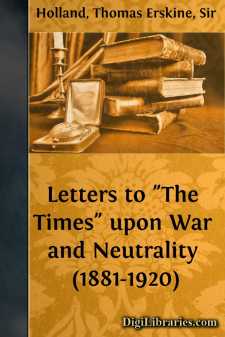Categories
- Antiques & Collectibles 13
- Architecture 36
- Art 48
- Bibles 22
- Biography & Autobiography 813
- Body, Mind & Spirit 142
- Business & Economics 28
- Children's Books 16
- Children's Fiction 13
- Computers 4
- Cooking 94
- Crafts & Hobbies 4
- Drama 346
- Education 46
- Family & Relationships 57
- Fiction 11829
- Games 19
- Gardening 17
- Health & Fitness 34
- History 1377
- House & Home 1
- Humor 147
- Juvenile Fiction 1873
- Juvenile Nonfiction 202
- Language Arts & Disciplines 88
- Law 16
- Literary Collections 686
- Literary Criticism 179
- Mathematics 13
- Medical 41
- Music 40
- Nature 179
- Non-Classifiable 1768
- Performing Arts 7
- Periodicals 1453
- Philosophy 64
- Photography 2
- Poetry 896
- Political Science 203
- Psychology 42
- Reference 154
- Religion 513
- Science 126
- Self-Help 84
- Social Science 81
- Sports & Recreation 34
- Study Aids 3
- Technology & Engineering 59
- Transportation 23
- Travel 463
- True Crime 29
Letters to "The Times" upon War and Neutrality (1881-1920)
Categories:
Description:
Excerpt
CHAPTER I
MEASURES SHORT OF WAR FOR THE SETTLEMENT OF INTERNATIONAL CONTROVERSIES
SECTION 1
Friendly Measures
Of the letters which follow, the first was suggested by a petition presented in October, 1899, to the President of the United States, asking him to use his good offices to terminate the war in South Africa; the second by discussions as to the advisability of employing, for the first time, an International Commission of Enquiry, for the purpose of ascertaining the facts of the lamentable attack perpetrated by the Russian fleet upon British fishing vessels off the Dogger Bank, on October 21, 1905. The Commission sat from January 19 to February 25, 1905, and its report was the means of terminating a period of great tension in the relations of the two Powers concerned (see Parl. Paper, Russia, 1905, No. 3): this letter deals also with Arbitration, under The Hague Convention of 1899.
It may be worth while here to point out that besides direct negotiation between the Powers concerned, four friendly methods for the settlement of questions at issue between them are now recognised, viz (1) Good offices and mediation of third Powers; (2) "Special mediation"; (3) "International Commissions of Enquiry"; (4) Arbitration. All four were recommended by The Hague Convention of 1899 "For the Peaceful Settlement of International Disputes" (by which, indeed, (2) and (3) were first suggested), as also by the amended re-issue of that convention in 1907. It must be noticed that resort to any of these methods is entirely discretionary, so far as any rule of International Law is concerned; all efforts to render it universally and unconditionally obligatory having, perhaps fortunately, hitherto failed.
It remains to be seen how far the settlement of international controversies has been facilitated by the establishment of a "League [002]of Nations" (to which reference is made in the concluding letters of this chapter), and, in particular, by the plan for the establishment of a "Permanent Court of International Justice," formulated by the League, in pursuance of Art. 14 of the Treaty of Versailles, and submitted to its members in December, 1920.
THE PETITION TO THE PRESIDENT OF THE UNITED STATES
Sir,—It seems that a respectably, though perhaps thoughtlessly signed petition was on Thursday presented to President McKinley, urging him to offer his good offices to bring to an end the war now being waged in South Africa. From the New York World cablegram, it would appear that the President was requested to take this step "in accordance with Art. 3 of the protocol of the Peace Conference at The Hague." The reference intended is doubtless to the Convention pour le règlement pacifique des conflits internationaux, prepared at the Conference [of 1899], Art. 3 of which is to the following effect:—
"Les Puissances signataires jugent utile qu'une ou plusieurs Puissances étrangères au conflit offrent de leur propre initiative, en tant que les circonstances s'y prêtent, leurs bons offices ou leur médiation aux États en conflit.
"Le droit d'offrir les bons offices ou la médiation appartient aux Puissances étrangères au conflit, même pendant le cours des hostilités....


